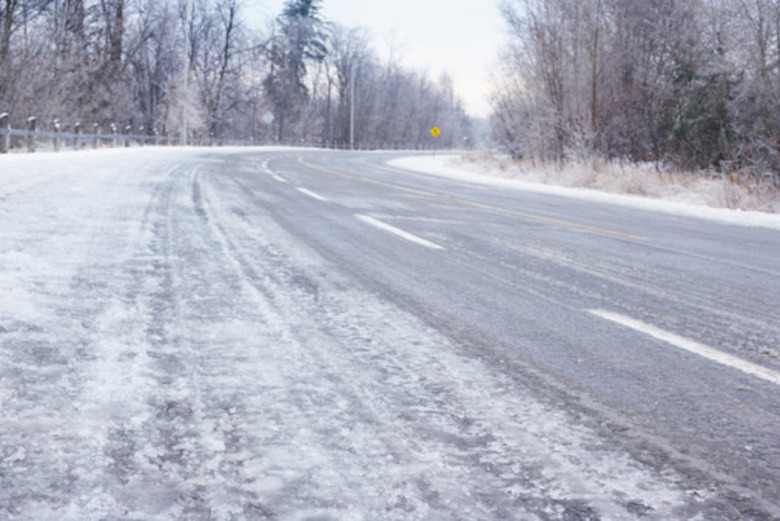Science Projects On What Freezes Faster: Water Or Sugar Water?
State and municipal governments frequently dispense salt as a de-icing agent on roads. It works by effectively lowering the melting temperature of the ice. This phenomenon — known as freezing-point depression — also provides the basis for a variety of science projects. The projects can range from simple to intricate — complete with mathematical predictions — depending on the grade level of the student. Furthermore, the list of required equipment includes only a sauce pan and a thermometer.
Freezing Point Depression
Freezing Point Depression
When solids dissolve in water, they form small, discrete particles. In the case of organic substances like sugar, the particles consists of individual sugar molecules. In the case of salts, such as table salt, also known as sodium chloride, the particles consist of the charged ions that make up the salt. The presence of particles in the water interferes with the ability of the water molecules to bind together to form a solid as the temperature of the water approaches its freezing point. Freezing point depression occurs in all liquids, not just water.
Measuring Freezing
Measuring Freezing
An experimenter must pay special attention to what exactly she is measuring and how she is measuring it. This comes down to the fundamental issue of asking the right questions. In this particular case, should the experimenter concern herself with what freezes faster, or the temperature at which the freezing occurs? The question of what freezes faster implies that if a sample of water and a sample of sugar water were placed in a freezer simultaneously, then one of them would freeze before the other. But what information would that actually provide? The speed with which a substance freezes relates to, among other parameters, the solution's heat capacity and the amount of substance. The better choice in this case would be to measure the temperature at which the solutions freeze because this answers the more important question: Do impurities in water affect its freezing point and if so by how much?
Getting Mathematical
Getting Mathematical
Chemists and physicists have well established the science and mathematics behind freezing point depression. For advanced students, or those with a strong interest in mathematics, the standard equation for the freezing point depression, delta(T), of a solution is delta(T) = -k * m, where k represents the molal freezing point depression constant of the solvent and m represents the molality of the solution, or moles of particles divided by the kilograms of solvent. This appears more complicated than it actually is. Assuming that water represents the only solvent used in the experiment, k = 1.86. Furthermore, sugar, also known as sucrose, exhibits a molecular weight of 342.3. The equation for freezing point depression now simplifies to delta(T) = -1.86 * (grams sucrose / 342.3 / kg of water). So, for example, if 10 grams of sucrose was dissolved in 100 mL of water, then 100 mL = 100 g = 0.100 kg, and delta(T) = -1.86 * (10 / 342.3 / 0.1) = -0.54 degrees Celsius. Thus, this solution should freeze at a temperature 0.54 degrees Celsius below the freezing point of pure water.
Advanced Projects
Advanced Projects
Rearranging the equation from Step 3 would allow an experimenter to measure delta(T) and then solve for the molecular weight, MW, of sucrose. That is, MW = (-1.86 * grams of sucrose) / (delta(T) * kg water). In fact, many high school and college-level chemistry students conduct experiments in which they experimentally determine the molecular weight of an unknown substance. The method also works with regard to boiling points, except the value for k changes to 0.52.
References
- Georgia State University, Dept. of Physics: Freezing Point Depression in Solutions
- Frostburg University, Dept. of Chemistry: Why Does Salt Melt Ice?
- College of DuPage, Dept. of Chemistry: Freezing Point Depression
- University of California-Irvine, Dept. of Chemistry: Using Freezing Point Depression to Find Molecular Weight
Cite This Article
MLA
Brubaker, Jack. "Science Projects On What Freezes Faster: Water Or Sugar Water?" sciencing.com, https://www.sciencing.com/science-faster-water-sugar-water-7936251/. 24 April 2017.
APA
Brubaker, Jack. (2017, April 24). Science Projects On What Freezes Faster: Water Or Sugar Water?. sciencing.com. Retrieved from https://www.sciencing.com/science-faster-water-sugar-water-7936251/
Chicago
Brubaker, Jack. Science Projects On What Freezes Faster: Water Or Sugar Water? last modified August 30, 2022. https://www.sciencing.com/science-faster-water-sugar-water-7936251/
